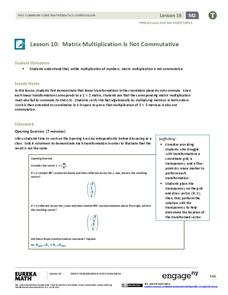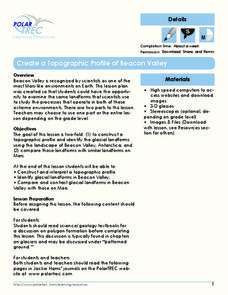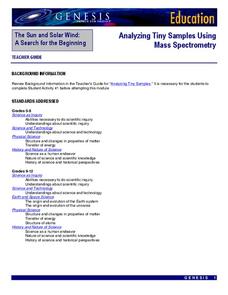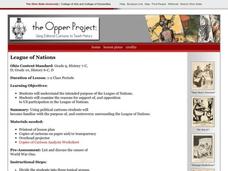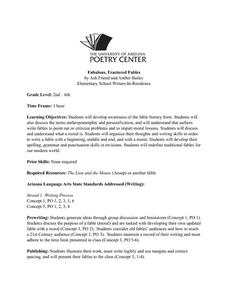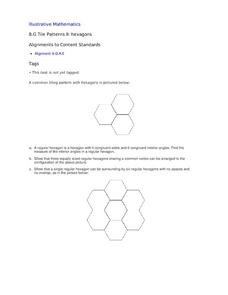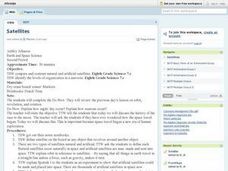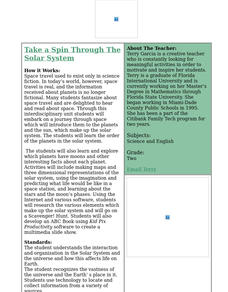Center for Learning in Action
Gases
Explore the properties of gases through one activity and two investigations in which super scientists observe the changes gas makes when encountering different conditions.
EngageNY
Matrix Multiplication Is Not Commutative
Should matrices be allowed to commute when they are being multiplied? Learners analyze this question to determine if the commutative property applies to matrices. They connect their exploration to transformations, vectors, and complex...
Polar Trec
Create a Topographic Profile of Beacon Valley
Landforms in Beacon Valley, Antarctica, where there is no snow, bear a striking resemblance to landforms found on Mars. Scholars identify landforms found in Beacon Valley through analysis of topographic maps in the activity. They then...
EngageNY
Choice of Unit
Explore using units with scientific notation to communicate numbers effectively. Individuals choose appropriate units to express numbers in a real-life situation. For this 13th lesson of 15, participants convert numbers in scientific...
LABScI
The Rutherford Atomic Model: Hidden Obstacles
Historically, scientists had to be creative to study subatomic structure. Scholars step into their minds to recreate the procedure Rutherford used to create his atomic model. Learners identify the creative efforts of early scientists...
NASA
Analyzing Tiny Samples Using a Search for the Beginning Mass Spectrometry
Teach the basics of mass spectrometry with a hands-on lesson. The fourth in a series of six lessons explores how mass spectrometry measures the ionic composition of an element. Learners then compare and contrast relative abundance and...
Curated OER
Rainforest Complexity and Diversity
Second graders investigate the diversity of plants and animals in a rainforest. They watch an online story developed by the Rainforest Alliance, observe and record animals in their local area, explore various websites, and compare and...
Curated OER
The Red Scare
Students identify and interpret issues of Nativism and Protectionism in early 20th Century America. They analyze the roots of anti-immigrant movements in the Post-World War One United States. Finally, students identify and explore the...
Curated OER
League of Nations
What is the League of Nations, when did it begin, and what is it's purpose? Young political minds can explore the answers to these questions through political cartoon analysis. Included are several political cartoons, an analysis...
Curated OER
Fabulous, Fractured Fables
Elementary schoolers develop an awareness of the literary form known as the fable. They explore how authors write fables to pass along moral lessons. After reading and discussing many famous fables embedded in the plan, learners attempt...
Baylor College
Gases Matter
As a demonstration or as a hands-on activity, your class watches as the combination of vinegar and baking soda produce carbon dioxide gas. The intent of the lesson is to help youngsters understand that gases occupy space. It is included...
Curated OER
Tile Patterns II: Hexagons
After learning that the sum of interior angles for triangles is 108 degrees, take it further to show that the sum of angles in any polygon is the same! Using hexagons, pupils practice finding the measure of the six congruent angles. Make...
Project Articulate
Textured Landscapes with Grant Wood
Explore the world of textured landscapes through the eyes of the famous artist, Grant Wood. Here is an elementary art lesson in which scholars learn about Grant Wood's life, view his work, draw their own textured landscape, and then...
NOAA
Plate Tectonics II
Mid-ocean ridges, rift valleys, island arcs, mountain ranges, earthquakes, volcanoes ... there are so many features associated with plate tectonics. The 14th installment of a 23-part NOAA Enrichment in Marine sciences and Oceanography...
Laboratory for Atmospheric and Space Physics
Goldilocks and the Three Planets
Venus is the second brightest object in the night sky after the moon. Here is an interesting lesson that explores three planets — Venus, Earth, and Mars — specifically their surfaces and atmospheres. Through an analysis of their spectra,...
Curated OER
Satellites
Eighth graders explore the history of space travel and satellites. Through a teacher demonstration, 8th graders observe how a satellite revolves another object. They identify natural and artificial satellites, explore how satellites...
Curated OER
Take a Spin Through the Solar System
Second graders participate in a variety of activities to explore the Solar System in this unit.
Curated OER
We're On A Mission!
Students examine the Mars Exploration Rover mission. In groups, they design their own mission while participating in a webquest. They write an essay using the information they gathered to propose their mission to the President. They...
Curated OER
The Great Hubble
Learners explain how Hubble telescope captures images from space. In this space science lesson, students use the internet to view space photos. They debate on an issue raised by the teacher.
Curated OER
The Cassini Robot
Pupils compare the functions of a robot to that of the human body. In this technology lesson, students identify the important components of the Cassini robot that would enable it to carry out space missions. They design and build their...
Curated OER
Charting The Progress of New Horizons
Learners explore the long distances and timescales involved in space travel. They track the progress of the New Horizons spacecraft and access the New Horizons website to discover the distance of the spacecraft from the Sun, and then...
Curated OER
Applying For The Mission
Students participate in a live simulation of traveling through space as part of a large science unit. They are encouraged to go into the community and ask for participation from parents and relatives. Students reflect upon their own...
Curated OER
Stellarium
Students explore the rotation of the planets from various locations on Earth
Using planetarium software, they will make observations, and explain how the rotation of the planets varies based on ones location on the Earth. Students...
Curated OER
Air: You Can't See It, But It's There!
First graders investigate that air occupies space by performing experiments that show this principle. Students are provided with a lunch bag. Students open the lunch bag and look inside. Students determine if there is anything in their...

